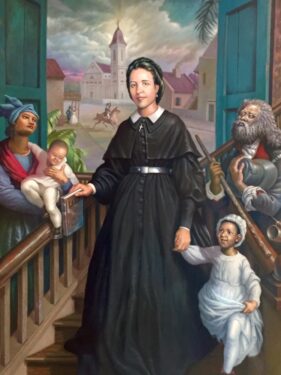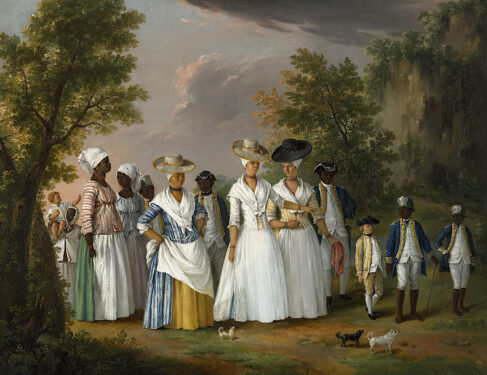
PROSPECT HEIGHTS — Henriette Díaz Delille, a free woman of color before the Civil War, knew privilege and comfort in New Orleans, which was then known as the biggest slave market in the South.
As a child, Delille wore fine clothes, and her family’s elegant home was in the now-historic French Quarter. But as a young woman she chose a very different life.
She became a religious sister and founded the second order of black nuns in the U.S., the Sisters of the Holy Family. They brought care and dignity to poor African and American-born slaves, orphans, elderly, and disabled. Their work continues today.
Delille’s obituary in 1862 stated, “For the love of Jesus Christ, she made herself the humble servant of slaves.”
Since 2010, she is known as Venerable Henriette Díaz Delille, one of the “Saintly Six” black Catholics from the U.S. being considered for sainthood.
 At age 24 she wrote, “I believe in God. I hope in God. I love. I want to live and die for God.” These words inspire Susan Rich, a retired educator from Montclair, New Jersey, who promotes Delille’s cause for sainthood.
At age 24 she wrote, “I believe in God. I hope in God. I love. I want to live and die for God.” These words inspire Susan Rich, a retired educator from Montclair, New Jersey, who promotes Delille’s cause for sainthood.
“When she made that declaration, she wanted to devote her whole life to God,” Rich said. “But she knew it had to be done in a different way because she would not be accepted into any religious order.”
Much like St. Frances Cabrini some 50 years later in New York City, Delille faced many obstacles trying to perform corporal and spiritual works of mercy — the first being the sociocultural institutions of her time.
Born in 1812, she was the great, great granddaughter of an enslaved African woman.
Her mother, Marie-Josèphe Díaz, was “quadroon,” a French term for an ancestry of a quarter African and three-quarters European.
The community comprised Creoles (people of mixed African and European heritage) who had purchased their freedom. They became wealthy entrepreneurs and landowners.
Catholicism was the dominant religion in New Orleans, but some free women of color did not become brides, instead choosing “plaçage” — a formalized system of concubinage in which they became mistresses to white men.
Often these arrangements involved dowries or transfers of real estate. Introductions were made at lavish events like the Quadroon Ball.

Marie-Josèphe thus groomed her daughter to find a white, wealthy partner just as she had done with the French businessman, Jean-Baptiste Lille Sarpy, the child’s father.
While it was illegal for slaves to read and write, children of plaçage relationships received extensive education. Delille was especially bright; around age 14, she began teaching catechism. Her faith grew in tandem with a profound compassion for the plight of enslaved African and American-born black people.
She also came to believe that plaçage offended the sacrament of marriage. Her family bristled when she chose the religious life instead.
Still, even a privileged woman of color was barred from joining a religious community in New Orleans. Mother Mary Lange founded the first order of black nuns, the Oblate Sisters of Providence, in 1829, but that was in Baltimore.
Delille enlisted her friends Juliette Gaudin and Josephine Charles to start religious orders run by women of color.
The Sisters of the Holy Family thus became the second order of African American nuns behind the Oblate Sisters of Providence of Mother Lange, also a candidate for sainthood.
Still, Delille faced more obstacles, like when the bishop of New Orleans declared the new sisters unfit to wear religious habits.
“That was such a blemish on the Catholic Church,” Rich said. “They were good enough to make their vows, but it wasn’t until eight to 10 years after Henriette Delille died that they could wear their habits in public.”

But the sisters were not deterred when it came to delivering mercy, especially during a yellow fever epidemic that hit New Orleans in 1853.
“They were giving so many people critical care — Africans, Creoles, and white people,” Rich said. “That’s when the Church recognized their good work.”
The sisters created parochial schools, retirement homes, and nursing care homes for people of African descent in New Orleans. The work continues today for people of all races throughout the U.S.
For example, Rich said the Lafon Nursing Facility of the Holy Family still operates.
In 2016 Rich founded the Friends of Delille/New Jersey Chapter to help the sainthood cause. She was a teenager while visiting the Sisters of the Holy Family in New Orleans.
She believes her chapter is the only one in the Northeast, so she encouraged people to start their own or simply join hers. Meanwhile, she makes presentations about Delille throughout New Jersey and, occasionally, New York City.
“In everything that I tell the kids about her life, and her works of mercy, I point out that we can all continue to live holy lives like hers,” Rich said. “Just go perform works of mercy.”
More information:
To find out more about Venerable Henriette Delille or to help her sainthood cause, email Susan Rich at sm.rich@verizon.net

Thank you Bill Miller for telling us about this holy woman who had to overcome discrimination/bias at a time when slavery was stil a large part of her society. May she successfully continue on her path to canonization! God bless Susan Rich for keeping her cause alive!
wonderful story!